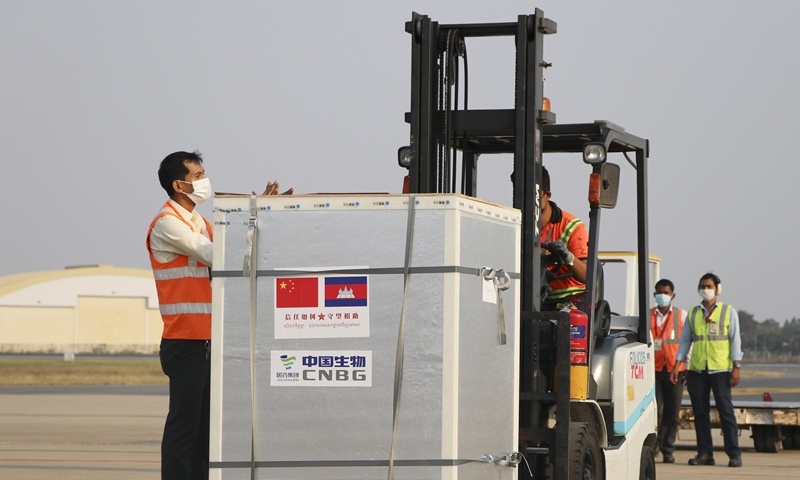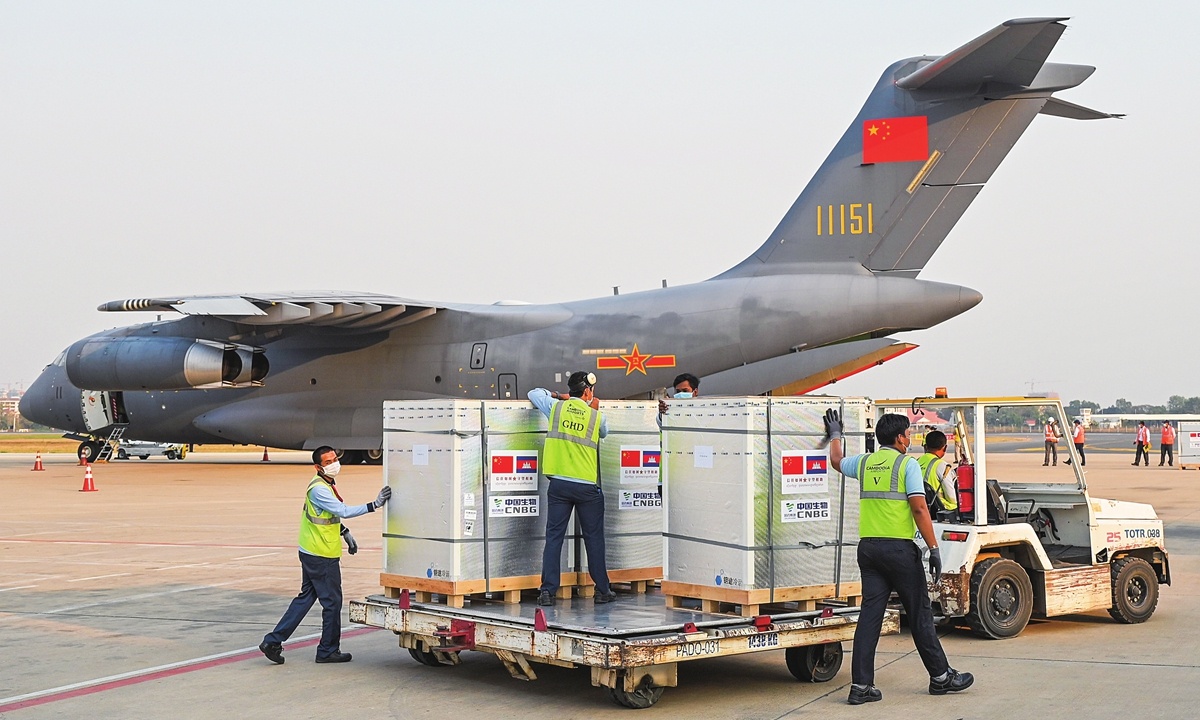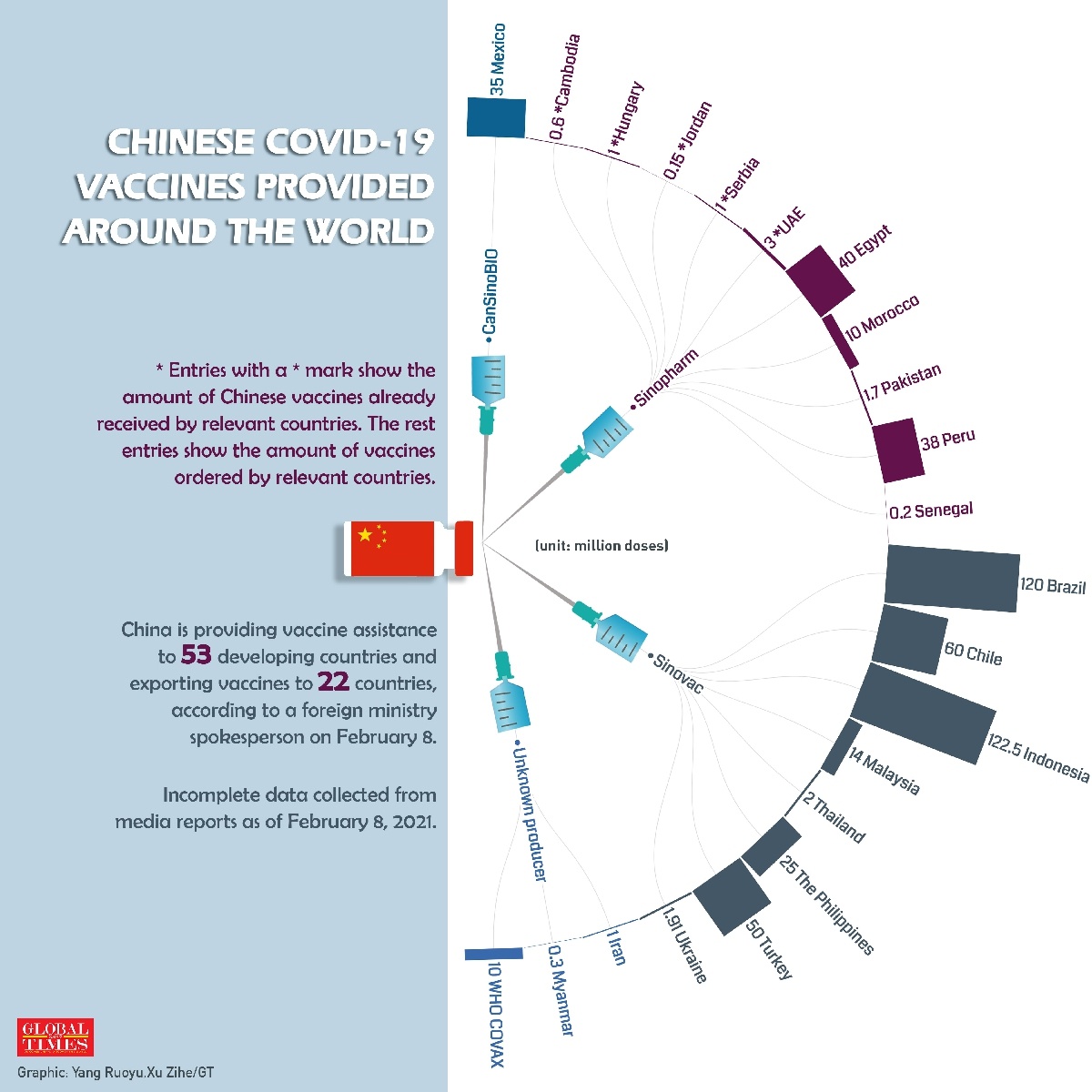
Workers transfer the China-donated Sinopharm COVID-19 vaccines at the Phnom Penh International Airport in Phnom Penh, Cambodia, Feb. 7, 2021. A chartered flight carrying the first batch of the China-donated Sinopharm COVID-19 vaccines arrived in Cambodia on Sunday, welcomed by Prime Minister Samdech Techo Hun Sen at the Phnom Penh International Airport. (Photo by Gao Bingnan/Xinhua)
With China projected to have at least three viable COVID-19 vaccines available to the public, China's airports are likely to see international cargo flights flood in to pick up COVID-19 vaccines in mid-2021, similar to scrambling for masks and other protective gears in the mid-2020.
Anticipating a surge in COVID-19 vaccine international purchases, Chinese vaccine producers have ramped up efforts to stretch production capacity without a break even during the upcoming Spring Festival holiday. Logistical services will experience peak-like volumes after the holiday domestically and internationally, as the vaccination campaign speeds up across the world, observers said.
The vaccine production capacity of one of China's leading producer Sinopharm can reach over a billion doses in 2021, Yang Xiaoming, chairman of China National Biotec Group (CNBG), affiliated to Sinopharm, confirmed again on Monday, promising that the manufacturer will ensure high-quality vaccines faster under safety standards.
Another leading producer, Sinovac, who received a conditional approval from the Chinese drug regulator on Saturday, told the Global Times that the company is constructing its third vaccine plant to increase production capacity. The company is working around the clock to prepare for mass production, even during the upcoming 7-day holiday.
The company has completed construction of its second plant which can raise the annual production capacity to over a billion doses after being put into operation in February, said Sinovac.
With the need to vaccinate hundreds of millions of people across the country as soon as possible, how to deliver the vaccines safely and timely to vaccination sites has become a challenge for the biggest-ever vaccination campaign. China's national vaccination scale is second only to the US at present.

Workers transport a shipment of COVID-19 vaccine of Chinese company Sinopharm from a Chinese military plane at Phnom Penh International Airport in Phnom Penh, the capital of Cambodia, on Sunday. Photo: AFP
Smooth logistics
China's domestic vaccine logistics will peak after the Spring Festival holiday as the Chinese national vaccination campaign starts to roll out for the general public after it concludes vaccination for nine priority groups, the Global Times learned from industry insiders.
Airlines and logistics companies are scrambling to arrange extra facilities to transport the vaccines. Government departments are also mobilizing resources and to screen qualified companies to ensure smoother transportation.
"Relevant departments and eligible companies are preparing to ship billions of vaccines using frozen boxes, temperature-controlled facilities, cargo planes and trucks in the national mega logistics system, and we have prioritized medical facilities for COVID-19 vaccines," a manager surnamed Chen working for SF Express logistics told the Global Times on Monday.
The industry estimates that China needs two billion doses of COVID-19 vaccine, and the current domestic cold chain system can meet the incremental demand, Healthcare Logistics Association of China Federation of Logistics and Purchasing (CHLA) told the Global Times on Monday.
China's refrigerated vehicles for medical transport have exceeded 10,000, and cold storage refrigeration technology, temperature and humidity recorders and other equipment have been widely used in vaccine cold chain transport in China, with high maturity, CHLA added.
"It is expected that the COVID-19 vaccine output in China will see huge growth in March and April, according to customers' orders and contact with customers. We have seen a transport peak at the end of January and our company will not suspend work during the Spring Festival," a manager surnamed Li of a Beijing-based logistics company qualified for COVID-19 vaccine transportation by the Ministry of Transport, told the Global Times on Monday.
Li also said there are special channels for the vaccine supply chain to foreign countries, which are usually escorted by armed police as the COVID-19 vaccines are "strategic supplies."

Chinese COVID-19 vaccines provided around the world Infographic: GT
Beefing up global transportation
As production capacity expands, China is providing vaccine assistance to 53 developing countries and exporting Chinese-made COVID-19 vaccines to 22 countries, the Chinese Foreign Ministry said at a regular press meeting on Monday.
Sinovac told the Global Times on Monday that it now exports semi-finished vaccines to countries capable of filling and packaging doses. It not only eases the pressure on Chinese production facilities, but also saves international transport costs and greatly improves the affordability of vaccines.
Sinovac vaccine shipping destinations, including Turkey, Brazil and Indonesia, have four different temperature levels, raising concerns about the impact of high temperatures on vaccine quality.
Sinovac told the Global Times that the latest laboratory test shows that its vaccine Coronavac can last 42 days below 25 degree Celsius, or 21 days below 37 degree Celsius. The company has successfully delivered tens of millions of doses of other types of vaccines to countries in Asia, the Mediterranean, Latin America and Africa, in accordance with WHO guidelines.
Alibaba's logistics unit, Cainiao Network, announced the launch of an air route in partnership with Ethiopian Airlines to aid the export of drugs that require temperature-controlled storage facilities, including COVID-19 vaccines. It is expected to soon help distribute the COVID-19 vaccine to parts of Africa, the Middle East and Latin America.
However, global logistics chain may meet challenge again at distribution pain points that were exposed in the early transportation of personal protective equipment (PPE) in 2020.
Such challenges include restricted airline capacity, delay in customs procedures due to pandemic control, and midway warehousing scarcity, industry insiders said.
For instance, some airlines do not allow cold-chain incubators with lithium battery thermometers, which creates problems for temperature control management especially for less-developed destinations, CHLA said.
Difficulties also lie in destinations, such as South America and Africa, where the temperature is higher now but infrastructure is limited. Power outages, for example, may cause refrigeration glitches. Storage capacity is further strained considering the high volumes required in these regions that accommodate several billion people combined.
Observers said the majority of global vaccine delivery is still relatively dependent on overseas-ready logistics service providers.
Chinese enterprises are normally responsible for vaccine shipment to domestic airports where they will give vaccines to foreign purchasers who will independently handle transportation service abroad, Qin Yuming, secretary general of the cold-chain logistics professional committee of the China Federation of Logistics and Purchasing, told the Global Times on Monday.
Qin noted that Chinese logistic companies may only handle the overseas logistics for donated doses, while other global shipments are normally handled by overseas giants such as UPS.
Only a very few Chinese logistic companies are certified to offer cross-border transportation for Chinese vaccines as it requires a complex management system to meet various cold-chain standards or conditions in different countries, the industry insider said.


